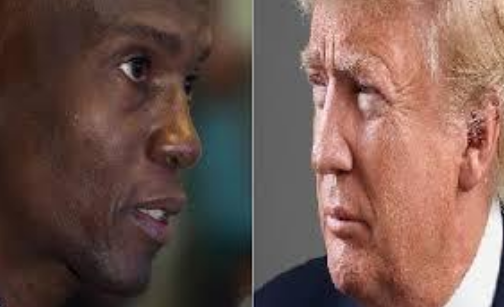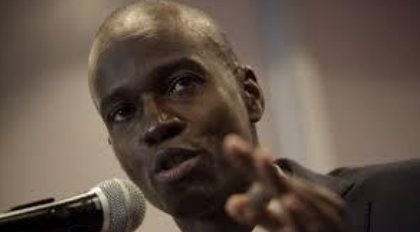- By Jacqueline Charles Miami Herald (TNS)
Florida Republican Sen. Marco Rubio has been one of Haiti’s most vocal supporters — urging the current government to side with the United States against longtime ally and oil benefactor, Venezuela’s Nicolas Maduro, and also warning the Caribbean nation against ditching Taiwan for China.
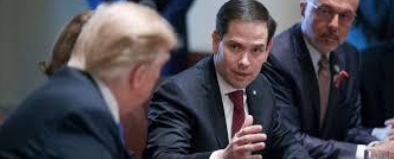
But on Monday as Haiti entered a fourth week of paralysis over demands for President Jovenel Moise to step down, Rubio said the U.S. has no role to play in the deepening crisis spurred by recurring fuel shortages and allegations of graft and mismanagement of the economy by Moise.
“My interest in Haiti has always been that it has democracy and elections and rule of law and I will continue to support it in those endeavors. Who they choose as their leader is up to the processes that they run internally,” Rubio told the Miami Herald. “We don’t have a role to play in who resigns and who stays on.”
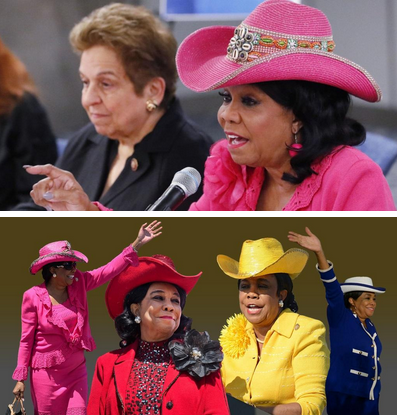
GIVE ME A BREAK! LOOK AT THIS LOONY IN THE HATS!
Rubio’s comments were in stark contrast to that of Florida Democratic Rep. Frederica Wilson, who after recently hosting a round-table discussion between the community and House Speaker Nancy Pelosi, said something had to give.
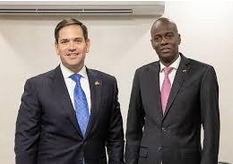
The country has been gripped by recurring political gridlock for most of the 32 months Moise has been in office. The latest episode, coming after a respite over the summer, has forced the closure of schools, and led to the loss of lives and businesses as a humanitarian crisis looms due to blocked roads.
In Haiti and in Miami, Haitians have accused the Trump administration of propping up Moise, and last week stepped up calls for the U.S. and others in the international community to disassociate themselves with him and support demands for his resignation. Demands, they say, that are coming from not just the political opposition but other sectors of Haitian society, including the Catholic and Protestant churches, judges, intellectuals, mayors and regular citizens.
“The Haiti people feel they cannot get gas, they cannot eat, they cannot do anything because of what the United States is telling them: Don’t get in contact with China. Don’t get in contact with Venezuela. Don’t get in contact with so and so,” Carline Paul, a Haitian-American activist told Pelosi during the Miami meeting.
“They want to be able to do the things that are going to move them forward because America has not delivered for them over the years,” Paul said. “Trump in the background is supporting Jovenel Moise.”
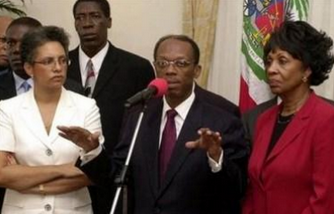
Paul said Haitians she had spoken to blamed much of their suffering on Moise’s decision in January to side with the Trump administration’s policy on Venezuela, which had provided fuel to Haiti on favorable terms under the PetroCaribe oil program.
While Rubio was not mentioned specifically, he’s was among those who pressured Haiti to cut ties with Maduro as he prepared to begin a new six-year term as president. Rubio also took to Twitter to publicly warn Haiti against ditching Taiwan for China, saying in March of last year, “it would inflict real & immediate damage on the U.S. relationship with Haitian govt.”
As chairman of the Senate’s subcommittee on Western Hemisphere, Rubio’s comments on Haiti came at the end of a speech Monday at an Inter American Press Association conference in Coral Gables, Fla., and as Haitians woke up to another day of burning tires, barricaded streets and canceled schools in Port-au-Prince and other cities.
Speaking to a roomful of journalists and news directors from across Latin America, Rubio touched on the crisis happening in Venezuela, Nicaragua and Cuba. He said having elections does not turn a country into a democracy, and no country could survive if it’s split into multiple parts.
“You cannot govern in a democracy if there is no consensus,” he said.
Asked later by the Miami Herald if that sentiment also applied to Haiti, where Moise was forced Monday to cancel a traditional ceremony opening the new judiciary year due to the ongoing political crisis and threats of protests, Rubio said: “That’s an internal matter for Haitians to decide. I don’t think it’s the proper job of the United States to call on a democratically elected leader to step down. That would be interference. Just like it would be wrong for the U.S. to step up and say he should stay.”
Some, however, have noted a contradiction pointing out that in 2004, the U.S. did step in and negotiated the departure of then democratically elected President Jean-Bertrand Aristide as he faced pressure from the business community to resign.
“I wasn’t in Congress in 2004,” Rubio said. “I can tell you that today, there’s a system of government in Haiti, whether it functions well or not, it’s up to the people of Haiti to decide. But we are not going to interfere on behalf or against any elected official.”
